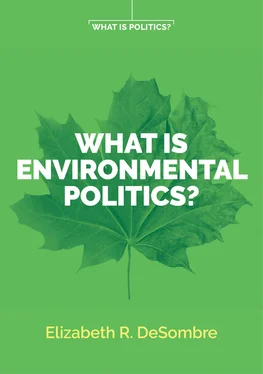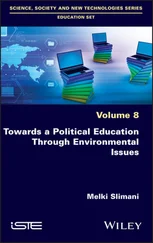The excess cost from what people refer to as “internalizing externalities” (in other words, from making the producer of the externalities bear a cost from creating them) may be only in the short term. Over time, the cost of preventing externalities will likely decrease. Innovation can create new ways to accomplish the same goals at a lower cost, and that kind of innovation is likely to happen when many industries need to minimize the pollution they create because of new rules. The initial cost the industry or business may have to bear from regulation is real – and is the reason these actors may fight against regulation – but over time the costs may decrease.
Collective Action Problems
Another reason people don’t experience most of the effect of the externalities created by their activities is that environmental problems tend to be collective action problems. In other words, one person’s contribution to air pollution is shared by the community that experiences it. The individual polluter might feel the effects of some of the pollution, but most of the effects are felt by others.
Another aspect of what it means to be a collective action problem is that, in many cases, no one person is responsible for creating a problem; each of us contributes a little bit. Fisheries depletion happens because of global or regional fishing; one person’s consumption of fish, and even one vessel’s fishing, contributes only a small amount. Climate change comes from the actions of many people, all over the world; one person’s airline flight, car ride, or home heating forms an unimaginably tiny portion of the problem. This is part of what it means for environmental problems to be diffuse – caused and felt by many different actors – the implications of which are discussed further in chapter 4.
There are implications that follow from understanding environmental problems as collective action problems. Most important is that, for many environmental problems, addressing them requires a lot of entities to change what they are doing. Even if you individually are willing to change, others may not be, and, if they don’t change, your contribution will make little difference. If, in order to decrease the problem of plastic pollution, you decide not to take a disposable cup or bag, the environment will hardly notice. The same is true with a fisher who reduces her catch of fish; if others don’t do the same, the fish stock will not improve. (In fact, the fish she doesn’t take will be there for others to take.) This is one of the biggest arguments for policy solutions to environmental problems. If you need a lot of people to change behavior, you may need rules to ensure that they will.
An additional important element of collective action problems is that whatever benefit is created is shared collectively. If a group of people organize to stop air pollution from a local factory, everyone who breathes the air benefits, even if most of them did not participate in working for that outcome. (The same thing would be true of the people who continued to take plastic bags or cups when others refrained in an effort to decrease plastic waste, or a fisher who doesn’t decrease her fishing.) Those people who benefit without contributing are called “free-riders.”
It can make sense to be a free-rider. At the individual level, most of us have busy, complicated lives, and making change is hard. If you went to the grocery store without bringing your own bag, the only way to get your groceries home may be to take a disposable bag from the store. The same is true for putting in the organizing effort to make political change. If you don’t participate in the protest or lobbying effort in your community to decrease air pollution, and it succeeds, you benefit from the cleaner air as much as those who did give their time and energy to political organizing, and you also have the benefits of whatever else you did with your time or resources.
For businesses the logic is even clearer. Since it can be costly to internalize (or prevent) externalities, bearing that cost when you are not sure your competitors will do so is foolish. Until there is a regulation in place that requires everyone to make the change, being a free-rider on making environmentally beneficial change is likely to be good for business.
Ultimately the issue is that free-riders, or the possibility that there will be free-riders, can make cooperation to address collective action problems extremely difficult. Since anyone can benefit from being a free-rider in the face of successful collective action, fewer people participate in making environmental or political change than should – in other words, most people who want the change, and would benefit from it, don’t participate in helping to bring it about. And the fear that not enough people will participate can lead all but the most committed activists to give up on their efforts. After all, if you hold a political rally and only a few people show up, your efforts will be in vain. You receive what game theorists call the “sucker’s payoff” – you bear all of the costs and get none of the benefits. 2Being aware of that risk can make people less likely to participate in collective action.
The environment isn’t the only issue that faces collective action problems. Any situation in which action is individual and the effects are collective is a candidate for collective action problems. Students organizing to get better dining hall food is an example of a collective action problem because, if they succeed, the benefit accrues to everyone, regardless of whether they contributed to the effort to improve the collective food. Citizens creating a lobbying day to pass a law requiring internet neutrality benefit no more from their successful efforts than do those who put their attention elsewhere. But additional characteristics of environmental problems, described below, make the collective action problems they face likely to be worse.
The characteristic of environmental issues that makes collective action problems especially difficult is that they are common pool resources (CPR; some economists call them common property resources). These types of issues share two qualities. The first is non-excludability. People cannot be kept from accessing the resources – say, the fish in a lake or the air into which pollution is emitted. Because of that lack of excludability, almost anyone can contribute to the creation of environmental problems. The effects are also widely shared, and so are the benefits of preventing or fixing the problems – if air pollution is cleaned up, everyone who breathes the air benefits. This aspect is the central one to the creation of collective action problems, discussed above, and can make it difficult to collaborate to solve them.
The second quality causes additional problems: CPRs are what is sometimes called “subtractable” (and sometimes called “rival”). That means that one person’s use of a resource (or contribution of pollution to a resource) can make that resource less useful for others. The factory that puts pollution into the air makes the air dirtier for others who want to breathe it. The fisher who takes fish from the ocean leaves fewer fish behind to reproduce or to be caught by others. That is part of what causes the environmental problem in the first place, but the most important aspect of subtractability is that it makes addressing the problem especially difficult. If most factories stop putting pollution into the air but one or two of them don’t, those factories can still decrease the quality of the air. If most who are fishing agree to fish less, those who do not change their behavior can simply catch more of the fish that remain. In other words, free-riders don’t just make it harder to cooperate (because you know that not everyone is bearing their fair share of the effort to solve a problem), they actively undermine the ability of others to address the problem. In some cases, free-riders can make solving the problem impossible.
Читать дальше












